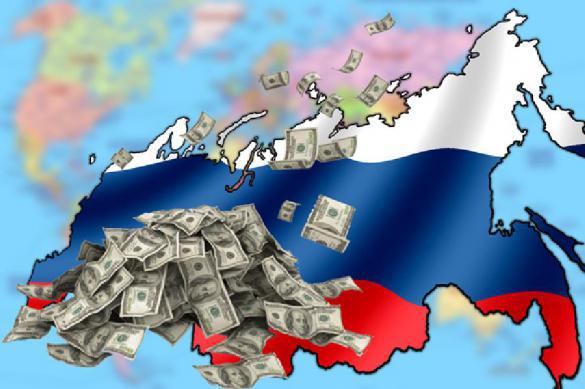Russia waves off threat of default and financial blackmail
Russia has weaned off the threat of default by fully securing possible lump payments on its public debt. In doing so, Russia has also waved off the threat of political blackmail through sanctions.

For the first time since 2014, Russia's net government debt has fallen below zero into the negative zone. This became possible owing to record reserves that have covered the debt of the state, RBC said. Net debt shows company's ability to pay the entire debt at the time of analysis. To do this, specialists compare the size of long-term and short-term borrowings with available highly liquid assets.
In a nutshell, if Russia found itself in need to pay off its debts immediately, it would be possible to do it at the expense of government deposits at the Central Bank and commercial banks.
Oleg Alexandrov, director of CEFK GROUP, told Pravda.Ru, that such an achievement may show positive influence on Russia's international ratings. "The state can now direct more investments into economy, including for infrastructure development," Oleg Alexandrov noted. According to the expert, the changing structure of prices on hydrocarbons, Russia may switch to developing non-oil exports and the non-oil sector of economy.
Russia can now enter the borrowing market for much more favorable conditions. Gazprom, for example, has placed its bonds at 1.1% per annum. Naftogaz of Ukraine - at 12% per annum. The Ukrainian company must thus pay a higher interest to compensate investors' risk. Russia's Ministry of Finance announced that it would enter the borrowing market if it could borrow at lower interest rates than existing ones - 3.4% per annum.
The accumulation of public debt in developed countries and issuing countries, especially in the United States, is not seen as a dangerous phenomenon, because those countries profit from selling their currency as a commodity. In order to repay and service previous debts, new ones are issued at lower rates. In other words, new loans keep their economies afloat.
For those countries that maintain complicated relationships with the United States, the accumulation of public debt is deemed dangerous. They may lose a possibility to refinance it being unable to access short-term borrowings, for example, as a result of appropriate sanctions. Russia experienced this situation in 1998 due to the crisis of the global financial system. Russia experienced default, the collapse of the national currency rate and the impoverishment of the population.
As usual, there is another side to the issue of debt stability. Against the backdrop of growing state reserves, the Russian economy is showing low growth rates. In the first half of 2019, Russia's GDP grew by only 0.7% in annual terms. The Russian government is running a tight budget policy, both in terms of control over government spending and the tax burden. The budget builds up savings by withdrawing assets from the private sector.
In developed countries the debt burden grows disproportionately to economic success. There is stagnation both in the USA and in Europe. The only solution to debt problems of developed countries is devaluation of reserve currencies. Such a move will lead to inflation and a decline in the welfare of the population of issuing countries. The dollar may lose its reserve currency status in the world, which will be very difficult to restore.
Subscribe to Pravda.Ru Telegram channel, Facebook, RSS!


